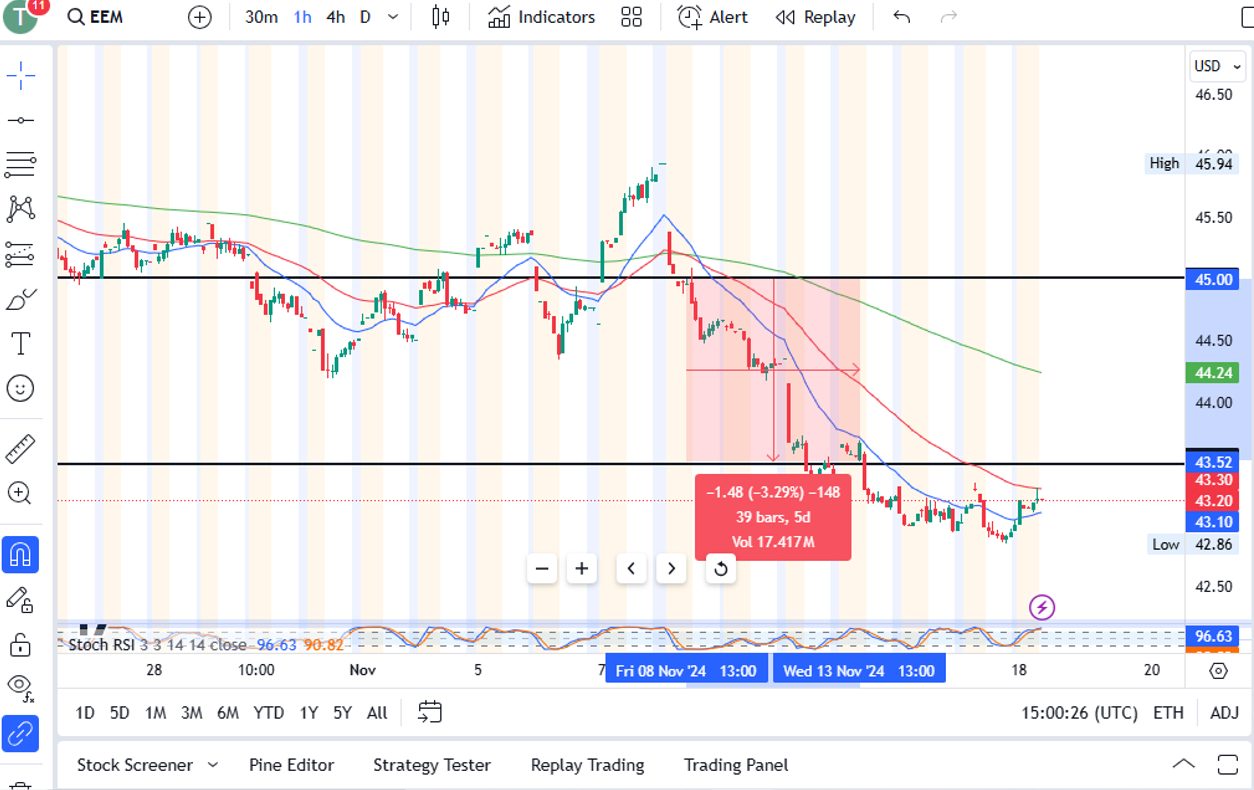CFD Trading In Ghana



Improving economic conditions and internet access for over 20 million people means contract for difference (CFD) trading in Ghana is on the rise.
CFDs provide a vehicle to profit from rising and falling markets that are important to Ghana’s economy like gold, as one of Africa’s top producers, and cocoa, as one of the world’s largest exporters.
In this beginner’s guide, we’ll unpack the essentials of CFD trading in Ghana, from the regulatory and tax landscape to the opportunities and risks.
Quick Introduction
- CFDs allow Ghanaian traders to speculate on the price movements of assets like equities on the Ghana Stock Exchange (GSE) without owning the asset itself.
- Unlike traditional investments, CFDs are a financial derivative that do not grant ownership of the asset, so you won’t receive benefits like dividends in Ghana’s stock market.
- Leverage is a core component of CFD trading, allowing you to multiply your investment with a modest outlay. For example, with 1:5 leverage, you can trade GHS 5,000 with GHS 1,000.
- CFDs remain high risk – with losses amplified through leverage and you may see slight price differences compared to the real market price of the asset.
- Ghana’s Securities and Exchange Commission (SEC) supervises the financial markets but has not developed robust regulations to specifically govern CFD trading, increasing the risks.
- Profits from CFD trading may be taxed by the Ghana Revenue Authority, potentially incurring Capital Gains Tax at 25% on investment assets or income tax up to 35%.
Best CFD Brokers In Ghana
After thorough testing, we found these 4 CFD trading platforms to be the best choices for traders in Ghana:
How Does CFD Trading Work?
A contract for difference (CFD) is a financial instrument you can trade and potentially profit from without owning the underlying asset, say, shares in MTN Ghana.
Essentially, a CFD is a financial agreement to pay the seller the difference in settlement price between a trade’s opening and closing price, and traders use CFDs to bet on whether the underlying asset’s price will rise or fall.
CFD contracts replicate live financial markets, and you can buy and sell these contracts the same way as other financial derivatives, using leverage to trade various financial markets both in Africa and globally.
What Can I Trade?
What you can trade depends on the CFD broker you deal with, but opportunities may include:
- Stock CFDs – You may be able to trade some of the best-performing Ghanaian stocks, such as SCB Standard Chartered Bank Ghana, GCB Bank (GCB), Fan Milk (FML), Dannex, and Ayrton Starwin (DASPHARMA). However, stocks from regions like the US, Europe and Asia are more widely supported and provide opportunities to diversify your portfolio beyond Africa.
- Index CFDs – You may be able to trade the Ghana Stock Exchange Composite Index through CFDs, an index that tracks the performance of all listed stocks on the Ghana Stock Exchange (GHS). You can also trade major global indices such as the FTSE 100, Wall Street, and US Tech 100 for global opportunities and potentially lower trading costs due to greater trading volumes.
- Forex CFDs – Currency pairs containing the Ghanaian cedi (GHS) are not generally available on CFD trading platforms in our experience. Plus, low trading volumes in GHS pairs could cause slippage issues and wide spreads for short-term traders. Alternatively, you could trade CFDs on major currency pairs like EUR/USD, USD/JPY, and GBP/USD.
- Commodity CFDs – You could speculate on commodities important to the Ghanain and wider African economy, notably gold, cocoa, and crude oil. These are widely supported by CFD brokers and exhibit fast-moving opportunities for day traders.
- Crypto CFDs – Interest in cryptocurrencies has taken off in Ghana, much like most of the world. You can use CFDs to speculate on cryptos like Bitcoin and Ethereum without having to actually store digital tokens.
- Exchange-Traded Funds (ETFs) – Trade ETFs with Ghanaian exposure, such as Camelot, Clydestone Ghana, AngloGold Ashanti and Absa Group, or other funds for exposure to other markets and various sectors.
Is CFD Trading Legal In Ghana?
CFD trading is legal in Ghana, but it is not specifically regulated by any dedicated local authority.
The Securities and Exchange Commission (SEC) in Ghana oversees the country’s financial markets, but there is no regulatory framework in place for CFDs.
This means that while trading CFDs is allowed, it operates in a more loosely regulated environment compared to more established markets like nearby South Africa.
Since Ghana does not have specific regulations for CFDs, many traders in the country rely on international brokers that are regulated by well-known financial authorities, such as:
- Financial Conduct Authority (FCA) in the UK
- Australian Securities and Investments Commission (ASIC)
- Cyprus Securities and Exchange Commission (CySEC)
Is CFD Trading Taxed In Ghana?
Active traders, such as day traders, may need to pay taxes on CFD trading profits, and understanding the tax implications is crucial for traders seeking to operate within Ghana’s legal framework.
Ghana taxes its resident individuals on income from any employment, business, or investment worldwide unless that individual is present outside Ghana for more than 183 days.
Although there may be varying tax brackets based on overall income, traders must comply with tax obligations to avoid penalties. Keeping proper records of trading activities, including profits and losses, ensures accurate tax filing and adherence to regulations.
Residents are subject to income tax at rates ranging between 0% and 35%, with non-residents paying taxes at the flat rate of 25%. Capital Gains Tax is levied at 25% on investment assets.
It’s best to seek professional advice on your tax obligations, given that tax rates can vary depending on many factors. This is key to staying compliant with Ghana’s latest requirements.
A Trade Example
To show you how CFD trading in Ghana actually works, here is an example of a short CFD trade of an ETF with African exposure, iShares MSCI Emerging Markets ETF.
Technical Analysis And Trade Entry
I used the momentum bounce strategy as a technical trader to go short on my ETF trade.
With price action on the daily, 4-hour, and 1-hour timeframes in an established downtrend, as you can see in the chart below, I used moving averages, stochastics, and trend lines to plot my strategy and identify long-term, established levels for my entry and exit points.
Dropping down to the 1-hour chart to get a tighter entry, I waited for the first bearish candle to close before entering the trade at 45.00 and setting my take profit order at 43.50.

Risk Management
The first rule for any serious trader is to protect your account. This is especially important when dealing with high-risk, leveraged products like CFDs.
Personally, I always calculate the position size according to my risk management rules, never risking more than 1% of my account balance and setting a stop-loss order to manage potential losses.
After monitoring my CFD trade closely on the 1hr, 4hr, and daily timeframes, the trade played out as planned, and my take profit order kicked in, leaving me to exit the trade.
A quick analysis of my trading plan and whether I had followed my strategy helped me review my performance, note any lessons learned, and determine how to tweak my strategy for future trades.
Bottom Line
CFD trading in Ghana is growing, driven by improving internet access and more favorable economic conditions.
It provides a flexible instrument for short-term traders looking to speculate on African and global financial markets.
However, leverage can be a double-edged sword, amplifying both profits and losses. So know your limits and never risk money you cannot afford to lose.
To get started, turn to our choice of the best CFD trading platforms to find a provider that meets your needs.
Recommended Reading
Article Sources
- Ghana Stock Exchange (GSE)
- Securities and Exchange Commission (SEC) of Ghana
- Ghana Revenue Authority
- The World Bank In Ghana
- Personal Taxes - PwC
The writing and editorial team at DayTrading.com use credible sources to support their work. These include government agencies, white papers, research institutes, and engagement with industry professionals. Content is written free from bias and is fact-checked where appropriate. Learn more about why you can trust DayTrading.com



